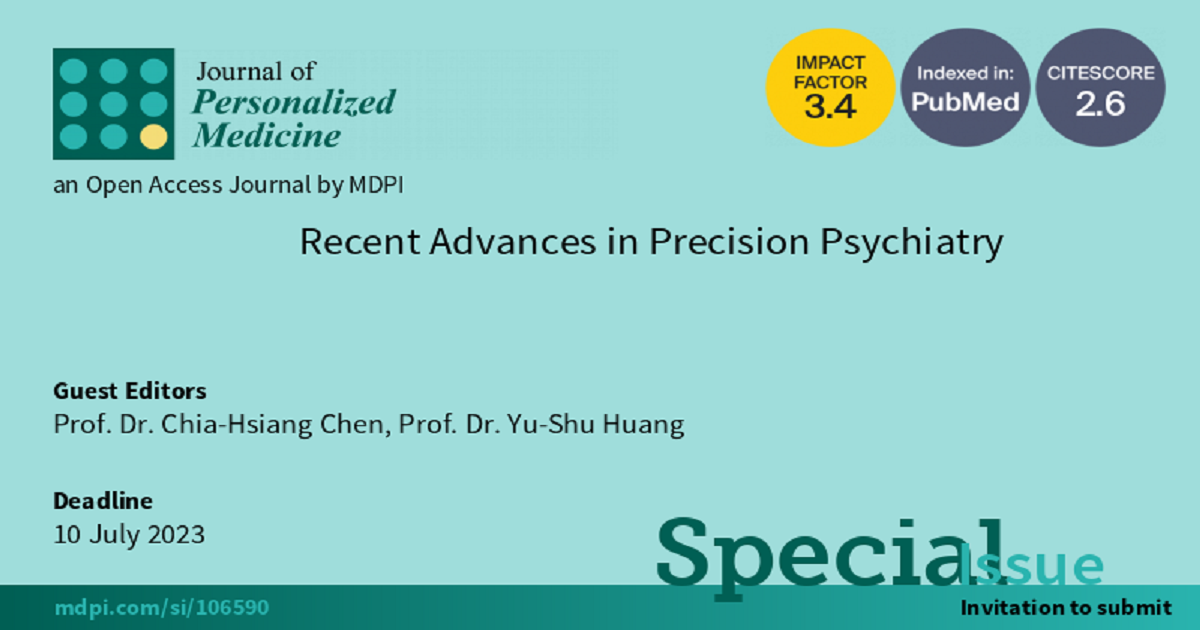Recent Advances in Precision Psychiatry
A special issue of Journal of Personalized Medicine (ISSN 2075-4426). This special issue belongs to the section "Omics/Informatics".
Deadline for manuscript submissions: closed (10 July 2023) | Viewed by 26416

Special Issue Editors
2. Department and Institute of Biomedical Sciences, College of Medicine, Chang Gung University, Taoyuan 333, Taiwan
Interests: etiology, pathogenesis, and treatment of major psychiatric disorders
2. School of Medicine, College of Medicine, Chang Gung University, Taoyuan 333, Taiwan
Interests: etiology, pathogenesis, and treatment of major pediatric psychiatric disorders and sleep medicine
Special Issue Information
Dear Colleagues,
In the 21st century, medicine has advanced to the era of precision medicine. The goals of precision medicine are to find the patient-specific etiology, understand the unique pathophysiology, and tailor treatment for every patient. Psychiatry is no exception. Every psychiatric patient is unique in the context of their biopsychosocial and spiritual perspectives. As the Russian novelist Leo Tolstoy wrote in his novel Anna Karenina, “All happy families are alike, each unhappy family is unhappy in its own way.” Precision medicine is most suitable and desirable in the field of psychiatry. The recent advances in genomics, functional genomics, pharmacogenomics, brain imaging, electrophysiology, stem cell biology, and genome editing, to name a few, have greatly facilitated advances in the etiological diagnosis, pathogenesis elucidation, treatment regimen optimization, and new therapy development of psychiatric disorders. This new frontier of precision psychiatry comes with many challenges, and it is also a daring adventure involving insightful and surprising discoveries. In this Special Issue, we will showcase some exciting and excellent research findings that move psychiatry to the area of precision psychiatry. We sincerely invite you to contribute your important research findings to this Special Issue.
Prof. Dr. Chia-Hsiang Chen
Prof. Dr. Yu-Shu Huang
Guest Editors
Manuscript Submission Information
Manuscripts should be submitted online at www.mdpi.com by registering and logging in to this website. Once you are registered, click here to go to the submission form. Manuscripts can be submitted until the deadline. All submissions that pass pre-check are peer-reviewed. Accepted papers will be published continuously in the journal (as soon as accepted) and will be listed together on the special issue website. Research articles, review articles as well as short communications are invited. For planned papers, a title and short abstract (about 100 words) can be sent to the Editorial Office for announcement on this website.
Submitted manuscripts should not have been published previously, nor be under consideration for publication elsewhere (except conference proceedings papers). All manuscripts are thoroughly refereed through a single-blind peer-review process. A guide for authors and other relevant information for submission of manuscripts is available on the Instructions for Authors page. Journal of Personalized Medicine is an international peer-reviewed open access monthly journal published by MDPI.
Please visit the Instructions for Authors page before submitting a manuscript. The Article Processing Charge (APC) for publication in this open access journal is 2600 CHF (Swiss Francs). Submitted papers should be well formatted and use good English. Authors may use MDPI's English editing service prior to publication or during author revisions.
Keywords
- precision medicine
- psychiatry
- personalized medicine
- genomics
- functional genomics
Benefits of Publishing in a Special Issue
- Ease of navigation: Grouping papers by topic helps scholars navigate broad scope journals more efficiently.
- Greater discoverability: Special Issues support the reach and impact of scientific research. Articles in Special Issues are more discoverable and cited more frequently.
- Expansion of research network: Special Issues facilitate connections among authors, fostering scientific collaborations.
- External promotion: Articles in Special Issues are often promoted through the journal's social media, increasing their visibility.
- e-Book format: Special Issues with more than 10 articles can be published as dedicated e-books, ensuring wide and rapid dissemination.
Further information on MDPI's Special Issue polices can be found here.







